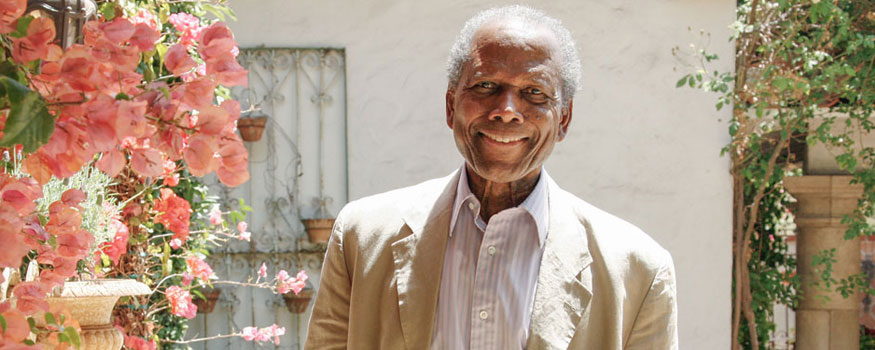By Terri Francis
As an actor, Sidney Poitier—who was born in Miami and received an honorary degree from the University in 1986—challenged the social order, according to School of Communication associate professor Terri Francis.
One of the important ways we assess Bahamian American Sidney Poitier’s history in civil rights is through photographs where he is sitting with, laughing with, and whispering to noted singer, songwriter, activist, and actor Jamaican American Harry Belafonte. The joy, intimacy, and humanity distilled there shows so much of what sustained him, what he was working toward, and the world he brought to his roles on and off the screen.
Poitier’s roles in more than 30 films portrayed and sparked important reflections around equity in the film industry and human dignity of African Americans in U.S. society, both on- and off-screen. In assessing his relationship to civil rights as an actor or to think about how he brought the freedom struggle to the film industry, it is helpful to think of his work prismatically. His off-screen public visibility refracted, reflected, contained, and expanded upon his screen roles, which in turn generated how we interpret his legacy. It goes back and forth like that across his star image.
Among Poitier’s body of work are films that explored white society’s complex ambivalence toward Black Americans, particularly those in positions of professional parity or of comparable destitution such as the pair of convicts on the lam in “The Defiant Ones.” There is sometimes the critique that he was too perfect, but I love his leading man image as an important resistance to being undone by racist nonsense.
Poitier played figures that you could see as actually extraordinary in their ordinariness. They were merely professionals doing their jobs competently, but they were also exceptional because doing their jobs meant challenging the social order that was built upon their absence.
For example, in the motion picture “In the Heat of the Night,” Poitier portrayed homicide detective Virgil Tibbs, whose investigation of a murder leads him to suspect Endicott, one of the town’s “leading white men” of the crime. Tibbs’s analysis put him in conflict with American social mores, which dictated that the feelings, comforts, and stories of white characters/audiences/people mattered more. Endicott’s presumed innocence was not to be questioned.
As a member of the acting profession, doing his job well meant that Poitier challenged the social order. He said on a few occasions that when he didn’t have creative control, he exercised the right of refusal. Jamie Foxx, Denzel Washington, and others have spoken of his guidance and mentorship in how to navigate the vicissitudes of his professional context—one that relied on his blackness while somehow being dismissive of it.
Poitier also directed films, which is an important example of his ambition, creativity, and investment in exploring storylines and characters where Black characters were concerned with their own relationships, adventures, and conflicts. Perhaps, here he sought and achieved creative control. And he could be a leading man. His romance films “For the Love of Ivy” and “A Warm December” are great examples of this.
Yet, let’s note that coverage of his films could be split between the Black press and others. The Chicago Defender called “A Warm December” “poetic,” while The Washington Post mocked the film by calling it “A (Luke) Warm December.” By contrast, the New York Amsterdam News wrote that “Poitier hits new high with A Warm December.”
His films portrayed important issues and histories within an expanded imagery that centered Black characters. It does seem that the white critical press was bored by films that didn’t center white characters or portray Poitier in conflict with a white person.
It’s not just that his characters weren’t stereotypical, they came with a world, with conflict, and with complexity. And he could make spare dialogue incredibly intense and full of meaning.
For instance, in one scene during “In the Heat of the Night,” detective Tibbs says, “Oh, I’ll have something cold, something soft.” He’s just asking for a soft drink, but I knew it was about to go down. What an actor.
I think when you understand the mental work of navigating American society as a Black person, you bring the X-ray vision to watch his films. Or, maybe, it doesn’t even take X-ray vision. Poitier is amazing—a cool, unbreakable surface with an oceanic depth.
As James Baldwin put it, “By the use of his own person, he must smuggle in a reality that he knows is not in the script.”
Terri Francis is associate professor of cinematic arts and associate dean for inclusive and critical publics in the University of Miami School of Communication.
This article originally appeared at https://news.miami.edu/stories/2022/01/remembering-trailblazing-actor-and-activist-sidney-poitier.html.







